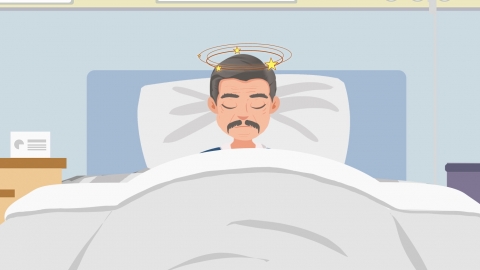Why do middle-aged and elderly people experience dizziness after waking up?
Generally, dizziness upon waking in middle-aged and elderly individuals may be caused by postural changes, poor sleep quality, anemia, benign paroxysmal positional vertigo, cervical spondylosis, and other factors. It is recommended to seek timely medical consultation to determine the exact cause and receive appropriate treatment. Detailed explanations are as follows:

1. Postural Changes
As people age, their ability to regulate blood pressure weakens. When rapidly transitioning from lying down during sleep to a standing position, blood may not return to the brain quickly enough, temporarily causing insufficient cerebral blood supply and resulting in dizziness. It is recommended to rise slowly from bed, allowing the body sufficient time to adapt to the change in posture.
2. Poor Sleep Quality
Middle-aged and elderly individuals may experience dizziness upon waking due to poor sleep quality, which prevents the brain from receiving adequate rest. This may be accompanied by symptoms such as fatigue and difficulty concentrating. It is recommended to improve the sleep environment by maintaining a quiet and comfortable bedroom and ensuring sufficient daily sleep duration.
3. Anemia
Due to chronic diseases, malnutrition, and other factors, middle-aged and elderly individuals are prone to anemia, which refers to a condition where the number of red blood cells or hemoglobin concentration falls below normal levels, impairing the blood's oxygen-carrying capacity and causing dizziness. This may also be accompanied by symptoms such as fatigue, pallor, palpitations, and shortness of breath. It is recommended to follow medical advice and use medications such as ferrous sulfate sustained-release tablets, ferrous fumarate tablets, and ammonium ferric citrate vitamin B1 syrup II to alleviate symptoms.
4. Benign Paroxysmal Positional Vertigo
Benign paroxysmal positional vertigo is an inner ear disorder, caused by factors such as inner ear degeneration or head trauma. This condition impairs balance function, leading to abnormal spatial perception and resulting in dizziness among middle-aged and elderly individuals. It may be accompanied by symptoms such as tinnitus, hearing loss, nausea, and vomiting. It is recommended to use medications such as promethazine hydrochloride tablets, betahistine hydrochloride tablets, and ginkgo biloba extract under medical guidance for treatment.
5. Cervical Spondylosis
With aging, degenerative changes gradually occur in cervical discs and joints, possibly leading to narrowing of the intervertebral foramina and compression of the blood vessels or nerve roots passing through them. Improper neck posture or pressure, such as sleeping with a pillow that is too high or too low, may exacerbate this compression, affecting cerebral blood supply and causing dizziness. This may also be accompanied by symptoms such as neck pain, shoulder and back pain, and arm numbness. It is recommended to follow medical advice and use medications such as aceclofenac tablets, Jingfukang granules, and mecobalamin tablets to alleviate symptoms.
It is recommended not to sit up or get out of bed immediately after waking. Instead, lie in bed for a while first, then slowly sit up and remain seated at the edge of the bed for a moment, allowing the body to adjust to the postural change and prevent dizziness.




